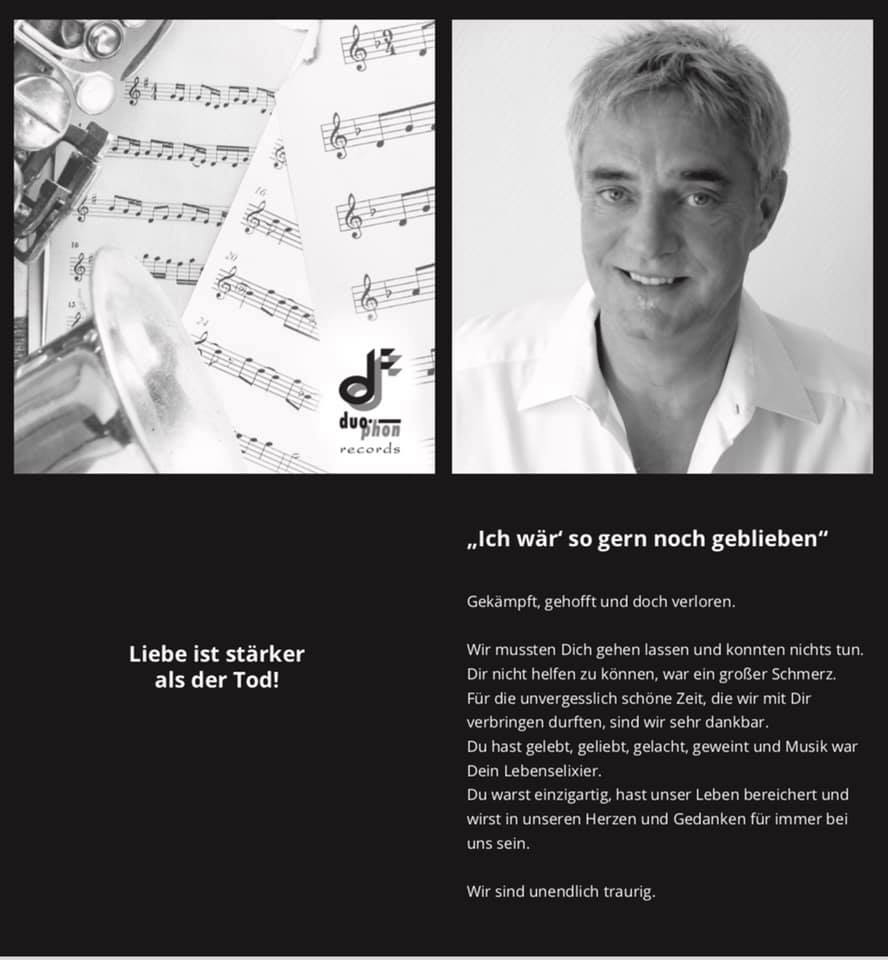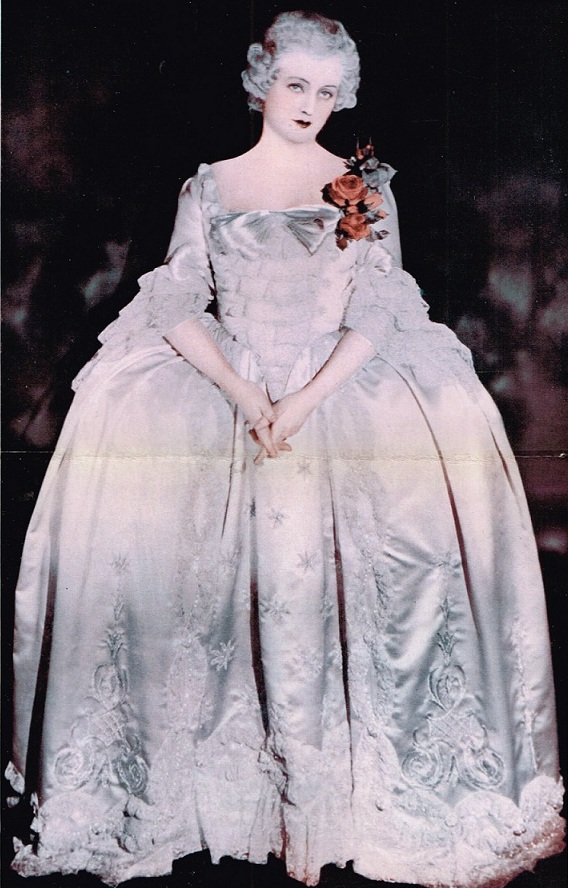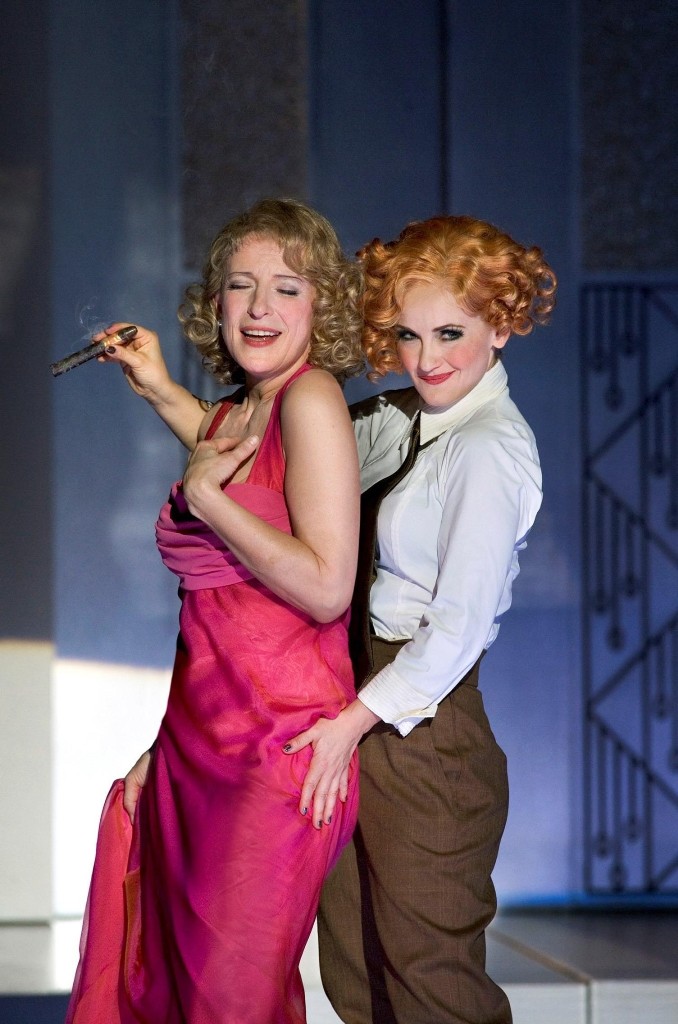Kevin Clarke
Operetta Research Center
22 April, 2019
It’s with great sadness that we heard about the death of Alfred Wagner this morning. He was the man behind record label Duophon which brought us so many wonderful albums of historic operetta – but also new recordings, such as Benatzky’s Meine Schwester und ich featuring Nora von Collande and Herbert Herrmann. I had the privilege of working with Alfred on that album, but it all started with our Im weißen Rössl adventure and the famous concept album that Alfred and I, together with Raoul Konezni, put together.

The obituary for Alfred Wagner, head of Duophon Records and Berliner Musenkinder.
As a producer Alfred Wagner was fun to work with, because he loved music and he cared for these historic recordings. His partner-in-crime, back then, was Raoul Konezni: a collector of rare Schellack discs. He organized them for Alfred, many were then masterfully restored by the one-and-only Christian Zwarg of Truesound Tranfers fame.
I remember sitting in Raoul’s overflowing little apartment, schellacks everywhere, piled up to the ceiling, and listening to various Rössl related discs. ‘Related’ meant that Raoul also played me a lot of material from other Erik Charell shows, recordings I never knew existed: Max Hansen singing Danilo in the jazzed up Merry Widow that Fritzi Massary starred in, for example “Da geh’ ich ins Maxim,” “Lippen schweigen,” and “Komm in den kleinen Pavillion.” (Unlike the Massary versions, these do not sound jazzy at all!)
There was also a recording of a Miss Kochhann singing the Witwe, instead of Massary. I had never heard of her before, but her “Vilja” – as in Hansen’s case there is a second ‘extended’ version of all titles – is marvelous and unjustly forgotten.

Miss Evelyn Lay as Madame Pompadour.
Most striking for me, however, was an orchestral potpourri of Madame Pompadour that Raoul played for me. There is a sweeping quality, there are never ending tempo shifts, and there is drama and bounce! It’s one of the best Pompadour recordings ever. Sadly, it has never been released in modern times.
I sat with Alfred and Raoul in the Duophon office next to Gedächtniskirche in Berlin and tried talking Alfred into making a Charell album, too, not just the Rössl disc, and bringing these goodies to a wider audience. But it was not to happen, because low budget record labels had started issuing pirated versions with Alfred’s well-restored recordings, selling them for practically nothing – and Alfred could not stop them, because the so called “mechanical rights” had expired and according to a court decision it was not possible to prove who had restored any given recording. So they were free to be used by anyone, which they were.

Newspaper drawing of Max Hansen (l.) as head waiter Leopold in “Im weißen Rössl” as opposed to how a ‘real’ White Horse Inn waiter looks; Berlin 1930. (Photo: Operetta Research Center)
Some of the historic Duophon operetta albums are among the greatest ever released: back in the 1990s I remember seeing them next to the cash register at a classical music shop in Berlin, wondering if I should invest the full price for them. I did and bought the Fritzi Massary album. Mildly put: it changed my life forever.
The other life changing experience came with Duophon’s Max Hansen album. I thought: ‘This is how operetta from Berlin sounds? Why did I not know anything about it? Why am I only getting this talk of Viennese Waltzes and classically trained voices on the EMI series? Why not people such as Hansen and Massary?’ Answering these questions has become my life’s mission, so to speak.

The Fritzi Massary album on Duophon Records.
Even though there was no Charell album, there were many albums about other artists: Wilhelm Bendow (Charell’s conférencier), Claire Waldoff (his other conférencier), Curt Bois, Marta Eggerth and so many others.
There were composer portraits, too, and again it was a Duophon album that changed my understanding of operetta fundamentally: the Paul Abraham disc still is one of my most cherished possessions. The way Abraham sounds in these restored historic recordings is nothing short of a revelation.

The Duophon album of Paul Abraham, first released in 2001.
There are also Benatzky and Kalman albums, Heymann albums, Willi and Walter Kollo, and so many more.
Apart for the artist and composer collections there were also conceptual albums, e.g. Albernes und Frivoles with frivolous and funny songs from the 1920s, featuring Paul O’Montis, Curt Bois, Willy Rosen. There is a “tea dance album” and there are Tonfilmschlager with Willy Fritsch, Marlene Dietrich, Richard Tauber et al.

The “Schwule Plattenkiste” album on Duophon Records.
There was also Die Schwule Plattenkiste with LGBTIQ songs, from the “Hirschfeld-Lied” to the “Lila Lied,” featuring Otto Reutter, Gustaf Gründgens, Claire Waldoff and others. That, too, made a deep impact on me, because it showed me as a gay young music student that there was music dealing with ‘my’ experience, music that I wanted to openly discuss and write about. If Alfred Wagner could release a disc with this material and topic, I could do so as a book. And I did, in 2007, with Alfred helping with the finances by putting an advertisement for Duophon into my Glitter and be Gay essay collection. (And he did so as a heterosexual man who had a lovely wife and no problem at all with anything LGBTIQ related.)
While most of the historic recordings run under the sub-label “Berliner Musenkinder” there is also a string of non-historic operetta recordings. I mentioned Meine Schwester und ich, based on the production at Komödie am Kurfürstendamm. Helga Benatzky made that recording possible back then, she also helped get the various other Benatzky albums out, aware how import it is for a new generation of operetta fans to know that there is this ‘other’ way of performing the genre, other to the then standard versions with Anneliese Rothenberger, Hermann Prey, or Nicolai Gedda.

The audio book version of Ralph Benatzky’s dairies, read by Günter Barton. (Photo: Duophon Records)
With the support of Helga Benatzky, Alfred also produced the Benatzky diaries as an audio book. He allowed me to be in charge of that and record my selection of texts with actor Günter Barton, who really did a marvelous job. Alfred included various historic recordings as atmospheric background on that disc, making Benatzky’s words come alive in a brand new way. It still is a recording I love hearing, again and again, and Mr. Barton’s reading still takes my breath away because it is so intimate and dramatic at the same time. Obviously, Benatzky’s dazzling descriptions of Berlin’s night life in the 1920s and 30s, his depiction of life in exile in Los Angeles and New York, his private observations about love, politics, and show business help making this glorious all-round.
Because Alfred Wagner was a huge jazz fan, there are many modern recordings from that area. It was also in the context of Duophon that I first heard jazz singer Katharine Mehrling (there is a wonderful Piaf au Bar album).

Dagmar Manzel (l.) and Katharine Mehrling in “Ball im Savoy,” Barrie Kosky’s production at Komische Oper Berlin. (Photo: Iko Freese / drama-berlin.de)
Katharine would go on to become one of the outstanding operetta artists of her generation, making a splash as Daisy Darlintgon in Abraham’s Ball im Savoy at Komische Oper Berlin, but also as Lorna in Kalman’s Arizona Lady. Seeing her and Serkan Kaya in Kalman’s cowboy operetta was another one of those turning points in my life.
It was Katharine Mehrling who posted the obituary for Alfred which I saw today. I would like to take this opportunity and say thank you to Alfred for all the music he has brought into my life, for the many fascinating talks we had over the years, among them the details on the law suit that the Heesters family waged against Alfred and Volker Kühn because they mentioned Heesters’ performance at the Dachau concentration camp in Hitler und die Künstler – Mit den Wölfen geheult:Von leichter Muse in schwerer Zeit – Unterhaltung und Kabarett im Dritten Reich. (Mr. Kühn and Alfred won the court case, by the way.) And I’d also like to thank Alfred for just being a wonderful person in my life.
His legacy will live on, I am sure. And when I hear Katharine Mehrling sing Daisy Darlington tonight – for the very last run of Ball im Savoy at Komische Oper – I’ll think of Alfred and wish he had released this performance in disc as part of his “Berliner Musenkinder,” showing that what he once started has blossomed in such surprising ways.

The Daniela Ziegler album of Benatzky chansons, with Adam Benzwi at the piano. (Photo: Duophon Records)
And just for the record: I also first heard of Adam Benzwi because he was the pianist of Daniela Ziegler on a Duophon album of Benatzky chansons. Tonight, Adam will conduct Ball im Savoy. He’s also conducting the Massary shows Perlen der Cleopatra and Eine Frau, die weiß, was sie will. In a way, we’ve come full circle.
Thank you, Alfred, for all of it!
For more information on Duophon Records, click here.
All images by Iko Freese are from www.drama-berlin.de (Agentur für Theaterfotos).
